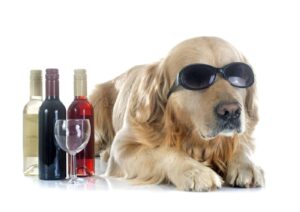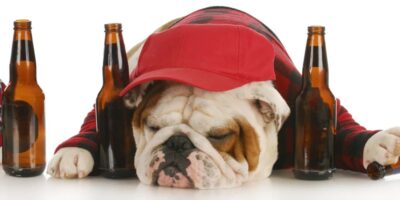The question of whether or not dogs can get drunk has long been debated by pet owners and veterinarians alike. While dogs are certainly capable of consuming alcohol, it is unclear whether or not they are affected by it in the same way that humans are. This article will explore the science behind alcohol metabolism in dogs and the potential risks and dangers of allowing a dog to consume alcohol.
Dogs, like all mammals, can technically get drunk if they consume enough alcohol. Alcohol affects dogs the same way it affects humans, but because of their smaller size and weight, it takes much less alcohol to get a dog drunk than a human.
Even small amounts of alcohol can be harmful to dogs. They can lead to symptoms such as vomiting, diarrhea, difficulty breathing, central nervous system depression, and in severe cases, coma or death. It is important to note that dogs also metabolize alcohol differently than humans, meaning it can take longer to break down the alcohol in their system. They may be at risk for alcohol poisoning for a more extended period.
It is not recommended to give alcohol to dogs in any form, not even in small amounts. This includes, but is not limited to, beer, wine, hard liquor, and food items that contain alcohol, like cakes or chocolates. Giving dog alcohol can also increase their risk of developing chronic liver disease, pancreatitis, and cancer.
Moreover, dogs do not have the same decision-making abilities as humans, so they might not be able to stop drinking alcohol if they have access to it.
Can dogs get drunk?

Dogs can indeed consume alcohol, but whether or not they get drunk like humans is a complex issue. The fact is that dogs metabolize alcohol differently than humans, and their tolerance for alcohol is much lower.
When a dog ingests alcohol, it is quickly absorbed into the bloodstream. It affects the brain, leading to the symptoms associated with being drunk such as disorientation, loss of coordination, and even coma or death.
However, the amount of alcohol a dog would need to consume to reach this state is significantly less than what a human would need to finish. A small amount of alcohol can cause severe damage or even death in dogs, and their tolerance for alcohol is much lower than that of humans.
It’s essential to be aware that alcohol can be found in many household items such as perfumes, cleaning products, and foods like bread dough, chocolate, or even some fruits. If your dog ingests any of these, it can lead to the symptoms of alcohol poisoning.
Also, dogs cannot understand the dangers of alcohol or make informed decisions about consuming it; this means that as an owner, it’s essential to keep any sources of alcohol out of reach of your dog.
Is it dangerous for dogs to drink alcohol?
It is dangerous for dogs to drink alcohol. Alcohol can cause a wide range of health problems in dogs, including vomiting, diarrhea, decreased coordination, breathing difficulties, coma, and even death. The amount of alcohol a dog would need to consume to reach these symptoms is significantly less than what a human would need.
This is because dogs metabolize alcohol differently than humans, and their tolerance for alcohol is much lower. When a dog ingests alcohol, it is quickly absorbed into the bloodstream and affects the brain, leading to symptoms such as disorientation, loss of coordination, and even coma or death.
Dogs need help understanding the dangers of alcohol or making informed decisions about consuming it. This means that as a dog owner, it’s essential to keep any sources of alcohol out of reach from your dog. Also, be aware that alcohol can be found in many household items such as perfumes, cleaning products, and foods like bread dough, chocolate, or even some fruits.
What are the symptoms of a dog being drunk?

Dogs that have consumed alcohol may display various symptoms depending on the amount consumed, the consumption rate, and the dog’s size. However, some common symptoms of a dog that has consumed alcohol include the following:
- Central nervous system depression can manifest as a lack of coordination, difficulty standing, and a general sluggishness or drowsiness. This can also lead to decreased reflexes and a lack of response to verbal commands or stimuli. Respiratory distress can manifest as shallow, rapid, or even labored breathing. In severe cases, this can lead to respiratory failure.
- Gastrointestinal symptoms such as vomiting and diarrhea. As alcohol is toxic to the liver, consuming alcohol can also lead to liver damage and liver failure in some cases.
It’s worth mentioning that other symptoms may arise, depending on the dog and the amount of alcohol consumed. For example, if the dog is tiny or has a health condition, the symptoms may be more severe.
Additionally, in extreme cases, alcohol consumption can lead to hypothermia, seizures, and even death. If you suspect your dog has consumed alcohol and is showing any of these symptoms, you should contact a veterinarian immediately.
Can dogs get drunk from drinking beer?
Dogs can indeed consume beer, but it is unsafe for them to do so. Beer contains alcohol, which can be dangerous for dogs. As their tolerance for alcohol is much lower than that of humans, even a tiny amount of beer can cause serious health problems in dogs. Drinking beer can lead to symptoms such as vomiting, diarrhea, decreased coordination, breathing difficulties, coma, and even death.
Additionally, beer contains hops that can harm dogs and cause severe health issues. Therefore, it’s essential to keep any sources of beer out of dogs‘ reach and never offer them beer.
How much alcohol can a dog drink before becoming intoxicated?

It is difficult to provide an exact amount of alcohol that would result in a dog becoming intoxicated, as it can vary depending on factors such as the dog’s size, the rate of consumption, and the dog‘s overall health and tolerance. However, even small amounts of alcohol can harm dogs and cause adverse effects.
According to the ASPCA, just a tiny amount of alcohol, such as a sip of beer, can be dangerous to a small dog. Consuming more than a tablespoon of alcohol can cause vomiting, diarrhea, decreased coordination, central nervous system depression, trouble breathing, and even death.
A small amount of a product with a high alcohol content, such as vanilla extract or perfume, could also be dangerous to a small dog.
It’s important to note that dogs also metabolize alcohol differently than humans, meaning it can take longer to break down the alcohol in their system. They may be at risk for alcohol poisoning for a more extended time. Therefore, it is not recommended to give any alcohol to dogs, and it’s best to keep any alcohol and alcohol-containing products out of reach of dogs to keep them safe and healthy.
What should I do if my dog drinks alcohol?
If you suspect your dog has consumed alcohol, acting quickly and seeking professional help is essential. The first step is to contact your veterinarian, who can advise you on what to do next. The veterinarian might ask you some questions to better understand the situation, and they will likely conduct a physical examination of your dog to assess its condition.
It is also essential to provide the veterinarian with information about how much alcohol your dog consumes and when.
This will help the veterinarian determine the appropriate course of action. This can include inducing vomiting, providing oxygen support, and hospitalizing the dog for observation, depending on the amount and type of alcohol consumed, the dog’s size, and how severe the symptoms are.
It’s worth noting that alcohol poisoning in dogs can be life-threatening and immediate treatment is crucial, so it’s important not to wait and seek help as soon as possible. In addition, preventing access to alcohol is vital to ensure the safety and well-being of your pet, so it’s essential to store alcohol and alcohol-containing products out of reach of dogs.
Is it okay to give a dog a small amount of alcohol as a treat?

It is not safe to give a dog any amount of alcohol as a treat. Even small amounts of alcohol can be harmful to dogs. They can lead to symptoms such as vomiting, diarrhea, difficulty breathing, central nervous system depression, and in severe cases, coma or death.
Additionally, dogs also metabolize alcohol differently than humans, which means it can take them longer to break down the alcohol in their system. They may be at risk for alcohol poisoning for a longer time. Giving dog alcohol can also increase their risk of developing chronic liver disease, pancreatitis, and cancer.
Moreover, dogs do not have the same decision-making abilities as humans, so they might not be able to stop drinking alcohol if they have access to it. So, it is not recommended to give alcohol to dogs in any form, and it’s best to keep any alcohol and alcohol-containing products out of reach of dogs to keep them safe and healthy.
How does alcohol affect a dog’s body?
Alcohol, even in small amounts, can be highly toxic to dogs. They are much smaller than humans, so it doesn’t take much alcohol to cause serious problems. When a dog ingests alcohol, it is rapidly absorbed into its bloodstream and can have a wide range of adverse effects on the body.
One of the most immediate effects of alcohol is on the dog’s central nervous system. As blood alcohol levels rise, a dog may become disoriented and uncoordinated and may have difficulty standing or walking. They may also become agitated or tired. In severe cases, alcohol poisoning can lead to seizures, coma, and even death.
Alcohol can also damage the dog’s liver and kidneys, leading to serious health problems. Dogs who consume alcohol regularly may develop chronic liver disease and kidney failure.
Ingestion of large amounts of alcohol can cause a drop in blood sugar, leading to hypoglycemia which could be life-threatening for some dogs.
Can dogs develop an addiction to alcohol?

Dogs can technically develop an addiction to alcohol, just like humans can. However, it is rare for dogs to develop an addiction to alcohol. This is because dogs do not typically have the same level of access to alcohol as humans do, and their instincts would not drive them to seek out alcohol as a source of pleasure or recreation.
Additionally, dogs do not have the same decision-making abilities as humans, and they are unlikely to seek out alcohol on their own. Dogs also do not have the exact emotional and psychological needs humans do, and they are not driven by the same emotional triggers that lead humans to drink, like stress or social pressure.
That being said, if a dog is repeatedly given alcohol, the dog may develop a physical dependence on it, meaning that their body may become accustomed to the presence of alcohol and may experience withdrawal symptoms without it. However, it is important to stress again that this scenario is improbable and not something pet owners should worry about, as it should be avoided by not giving any alcohol to dogs.
How long does it take for a dog to sober after drinking alcohol?
Generally, it takes dogs longer to metabolize alcohol than it does for humans. It could take several hours for the alcohol to be metabolized by the liver and eliminated from the dog‘s system. It can take 4 to 24 hours for a dog to sober up. It depends on the dog’s size and the amount of alcohol consumed.
However, it’s worth noting that the dog can still be at risk for alcohol poisoning even after the alcohol has been metabolized and the effects have worn off. Hence, it’s essential to seek professional help immediately and have the dog checked by a veterinarian.
Is alcohol more harmful to dogs than to humans?

Alcohol is generally more harmful to dogs than to humans. This is because dogs have different metabolism and tolerance levels than humans. Alcohol affects dogs differently than it does humans, and it takes much less alcohol to get a dog drunk than it does a human.
Moreover, even small amounts of alcohol can be harmful to dogs. They can lead to symptoms such as vomiting, diarrhea, difficulty breathing, central nervous system depression, and in severe cases, coma or death.
Additionally, dogs also metabolize alcohol differently than humans, which means it can take them longer to break down the alcohol in their system. They may be at risk for alcohol poisoning for a longer time. Therefore, it is not recommended to give any amount of alcohol to dogs, as it is more harmful to them than to humans.
Are there any long term effects of a dog drinking alcohol?
There can be long-term effects of a dog drinking alcohol. Consuming alcohol can cause damage to the liver and the pancreas, leading to chronic liver disease and pancreatitis. It can also increase the risk of cancer.
Additionally, consuming alcohol can cause neurological damage, and long-term consumption can permanently damage the nervous system. Even small amounts of alcohol can harm dogs, and repeated consumption can have severe and long-lasting consequences for your dog’s overall health.
Therefore, it is not recommended to give any alcohol to dogs, and it’s best to keep any alcohol and alcohol-containing products out of reach of dogs to ensure their safety and well-being.
Conclusion
Can dogs get drunk at this moment conclude that while it is technically possible for dogs to get drunk, it is highly unlikely and not recommended! Alcohol can be toxic to dogs; even small amounts can cause vomiting, diarrhea, and other serious health problems.
Dogs have a much lower tolerance for alcohol than humans do, so it would not take much for a dog to experience adverse effects. It is essential to keep any alcoholic beverages away from dogs and seek medical attention if you suspect your dog has consumed alcohol.
As pet owners, it’s our responsibility to ensure their safety and well-being by keeping them away from potential dangers like alcohol.

